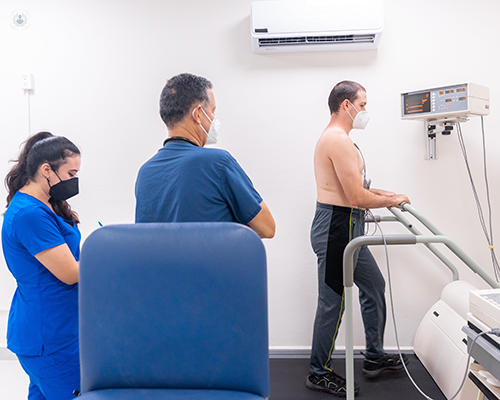Having a stress echocardiogram
Autore:A stress echocardiogram, or an exercise stress test, is a test that shows how well the heart works under increased stress, such as during physical exercise.
Here, Dr Ahmed Elghamaz, renowned consultant cardiologist in London, provides an expert insight into a stress echocardiogram, offering reassurance for patients on safety and what to expect, as well as the next steps following the procedure.

What is the purpose of a stress echocardiogram?
The purpose of a stress echocardiogram is essentially to assess the significance, or the presence, of coronary artery disease.
Within cardiology, there are two ways to test for this condition:
- Anatomical: To see if there is plaque (fatty deposits) in the coronary arteries that supply blood to the heart. This method gives an anatomical description of the deposits or disease in the arteries.
- Physiological: To see if the coronary arteries are supplying enough blood to the heart muscle. This method is where tests such as a stress echocardiogram - which is now a gold standard test - are very much at the forefront of assessing any physiological or significant impairment of blood flow to the heart muscle.
When is this type of test performed?
A stress echocardiogram is used in many different ways.
The test is mainly performed either:
- To rule out the presence of significant coronary heart disease.
- To assess the significance of coronary heart disease, which has been seen on an anatomical test such as a CT angiogram.
- As a risk stratification technique, to assess the presence or the amount of ischaemia (decreased blood flow) in the heart.
- As a risk stratification technique, to assess the lack of blood flow to the heart muscle.
A stress echocardiogram is a very simple, straightforward, and safe way to assess the presence of any significant coronary disease with physiological meaning. In other words, it is a method to assess whether the presence of plaque (or any other deposits) in the coronary arteries are causing problems to the blood flow to the heart.
What can patients expect on the day of their stress echocardiogram?
A stress echocardiogram is simply an exercise stress test. It involves the patient walking on a treadmill machine, which is exactly the same as any treadmill machine in a gym. There is no preparation required, and no need for the patient to fast.
Firstly, we perform an echocardiogram (imaging of the heart with an ultrasound scan). The patient then gets on the treadmill machine, and walks until a target heart rate is achieved. Once this target has been achieved, images of the heart are taken very quickly. This is done to compare the heart at rest and the heart at peak stress, and to see if there is any impairment of blood flow to the heart at peak stress.
Is this test safe?
A stress echocardiogram is extremely safe, because it is a physiological way of stressing the heart. Almost 98 per cent of the patients that we see are assessed this way.
Very rarely, if patients can’t walk on a treadmill machine, we give medications to stress the heart in a pharmacological way.
What are the next steps following a stress echocardiogram?
Images are often analysed immediately or within the same day after the stress echocardiogram. With these images, we can then establish if there is ischaemia, or if the heart is performing extremely well under stress without compromising blood flow.
If there’s no impairment of blood flow, patients can be reassured that, under stress, the heart is receiving the blood flow it requires.
If, on the other hand, there’s evidence of impairment of blood flow to the heart with stress, it’s very likely that the patient will then require an invasive assessment. This may be a coronary angiogram followed by a revascularisation or opening up of the coronary arteries to restore blood flow to the heart.
If you’re having a stress echocardiogram and you would like to discuss your concerns or options with an expert, don’t hesitate to book an appointment with Dr Ahmed Elghamaz via his Top Doctors profile today.


